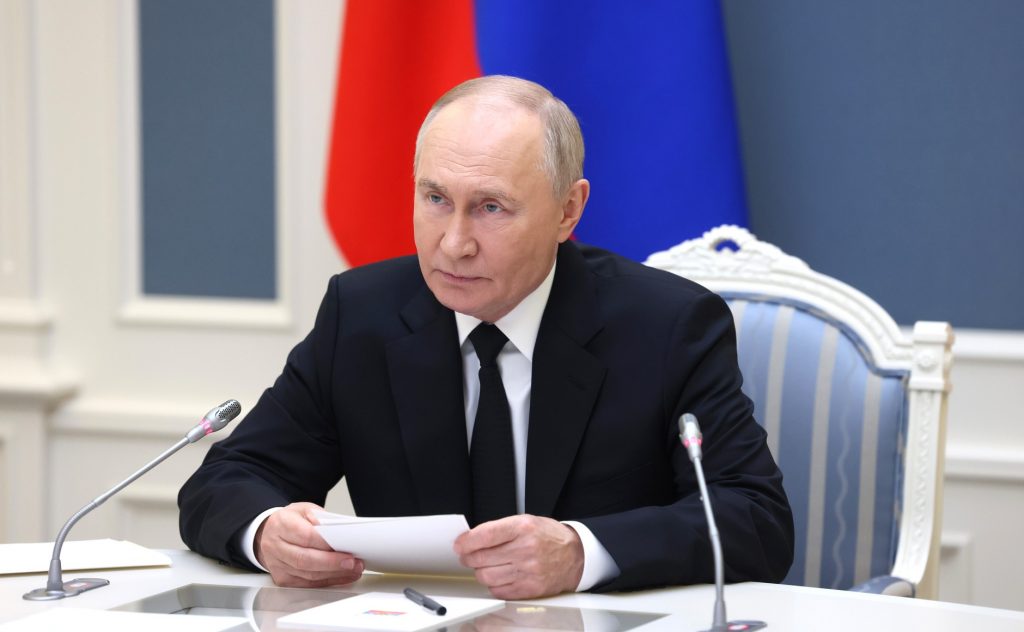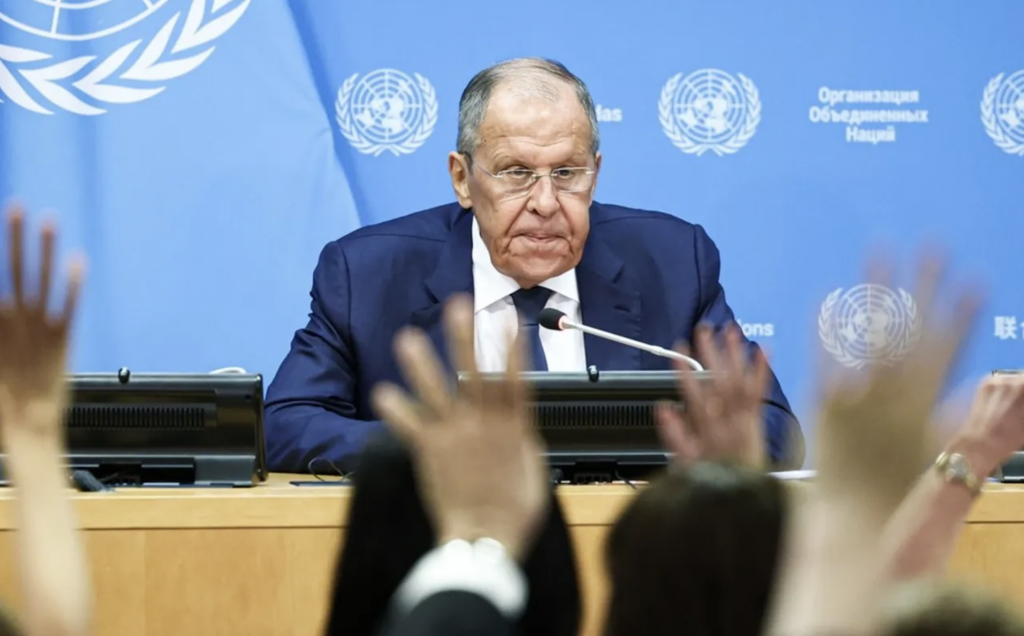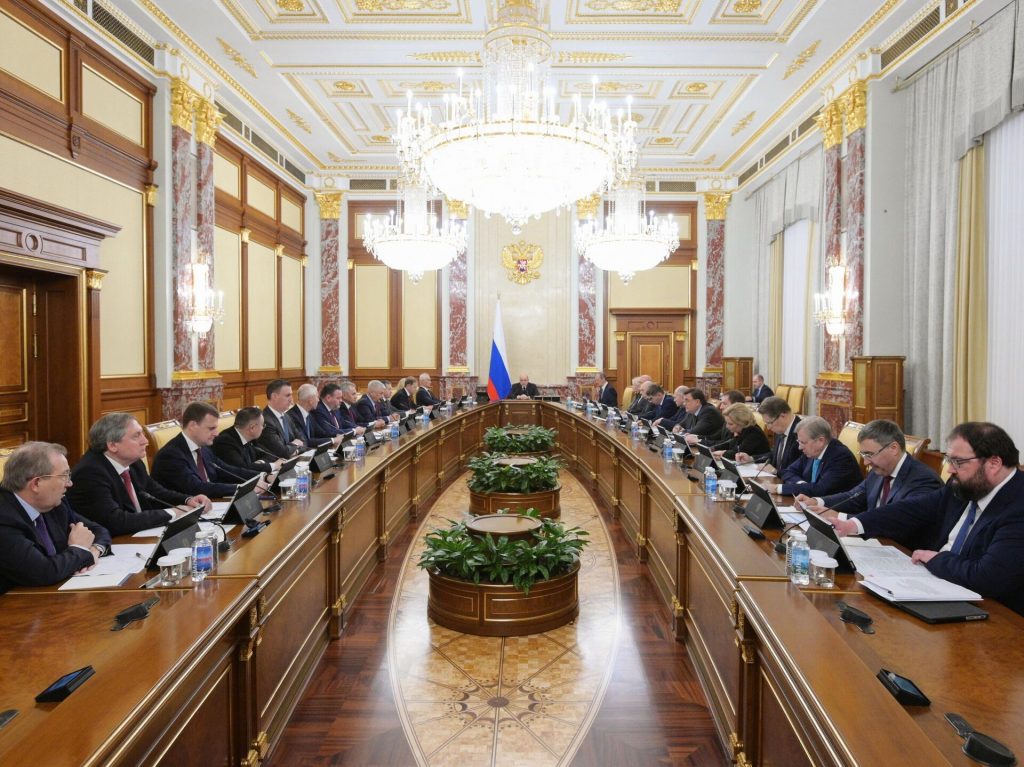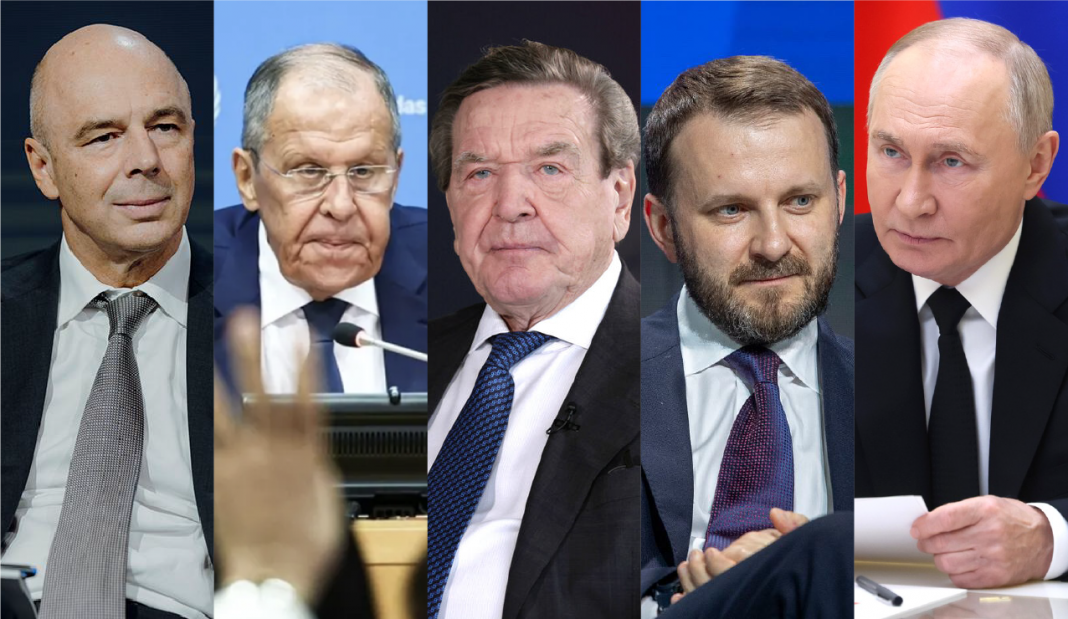In this digest, Ascolta presents a comprehensive analysis of key political, economic and social developments in Russia that have a direct impact on both the country’s domestic processes and international relations. We take an in-depth look at how Russian government decisions, economic developments and public sentiment are shaping the political agenda and affecting domestic stability.
Special attention is paid to the consequences of these events for Russia’s foreign policy, its relations with key international players, and possible changes in the global geopolitical landscape.
This Content Is Only For Subscribers
OFFICIAL EVENT OVERVIEW
- President of the Russian Federation

After the BRICS summit, which took place in Kazan on October 22-24, the Russian president returned to the domestic political agenda, focusing mainly on economic issues. At the same time, the topic of war and possible ways to end it once again intensified on the information agenda. On the other hand, many processes in the Kremlin were frozen due to expectations of the results of the presidential election in the United States. And we are talking not only about the Ukrainian issue, but also about a whole range of geopolitical processes, the outcome of which will definitely depend on the further configuration of power in Washington.
Vladimir Putin started his week with a meeting on economic issues. Traditionally, it was held in an online format. The meeting was also attended by Prime Minister Mikhail Mishustin, Head of the Presidential Administration Anton Vaino, Deputy Prime Minister – Head of the Government Staff Dmitry Grigorenko, Deputy Prime Minister Alexander Novak, Deputy Prime Minister Marat Khusnullin, Deputy Head of the Presidential Administration Maxim Oreshkin, Minister of Industry and Trade Anton Alikhanov, Minister of Finance Anton Siluanov, and Central Bank Governor Elvira Nabiulli
During the meeting, issues “of great importance for supporting business and investment activity in the regions and in Russia as a whole” were discussed. In his opening speech, the president noted that despite the fact that the GDP dynamics in the third quarter of this year has slowed down somewhat, the Russian economy continues to grow. According to the Ministry of Economic Development, GDP added 4.2% in January-August. According to Putin, unemployment among young people under the age of 25 is also decreasing: now it is less than 9%. Over the year it has decreased by more than 2% – from 11.6%. At the same time, Elvira Nabiullina became the main speaker at the meeting.
In this context, it is important to note that on the eve of the meeting on economic issues, the Central Bank of Russia raised the key rate by 200 bp. – from 19% to 21%, which was an absolute record. The previous maximum was 20% and was reached in February 2022 amid the freezing of Russia’s foreign exchange reserves abroad. According to Nabiullina, this situation is caused by inflation, which shows a higher level than predicted. At present, according to official information, it is 8.62%, although the preliminary forecast was calculated for its reduction to 4.5-5% by the end of the year. Of course, there are no serious problems for the Russian economy, but the president’s forced response to this situation may indicate the strengthening of disappointing trends for the military economic system.
Already on Tuesday, October 29, Vladimir Putin held a training session of the strategic deterrence forces. A Yars intercontinental ballistic missile was launched from the Plesetsk State Test Cosmodrome at the Kura test site in Kamchatka. The Sineva and Bulava ballistic missiles were launched from the waters of the Barents Sea from the nuclear-powered strategic missile submarine cruiser Novomoskovsk and from the Sea of Okhotsk from the nuclear-powered submarine cruiser Prince Oleg. Also involved in the training were Tu-95MS long-range aviation aircraft carrying out launches of air-launched cruise missiles.
“Given the growing geopolitical tensions and the emergence of new external threats and risks, it is important to have strategic forces that are modern and constantly ready for combat use. We will continue to improve all their components. We have the resources for this. I emphasize that we are not going to be drawn into a new arms race, but we will maintain nuclear forces at the level of necessary sufficiency,” the Russian president said after the training. It is noteworthy that the missile launches themselves took place exactly one week before the U.S. presidential election.
On the same day, the President spoke at the plenary session of the National Healthcare 2024 Congress. In his speech, Putin touched upon the production of domestic medicines, the development of the healthcare system, as well as increasing life expectancy: “One of the main goals for the coming years is to increase life expectancy. And I would like to emphasize the need to reduce the differentiation in this parameter between regions. It is well known that life expectancy for men is still lower than for women. We need to consistently address all these problems. In general, life expectancy should reach an average of 78 years. And in the future, as previously planned, we will have to reach the level of 80 plus.
On Wednesday, October 30, Vladimir Putin held a meeting with members of the Government via videoconference. The main speaker at the meeting was the Minister of Agriculture of the Russian Federation Oksana Lut with a report on the integrated development of rural areas in the perspective until 2030. In addition, the President heard reports from the relevant ministers on the launch of the heating season and the process of gasification at the regional level.
It is noteworthy that on Friday, November 1, Vladimir Putin held only one meeting – with the head of Khakassia, Valentin Konovalov. This time the traditional meeting with permanent members of the Security Council was postponed to Saturday. The main topic of the meeting was the issue of information security, including in the Internet. Minister of Digital Development, Communications and Mass Media Maksut Shadaev made a report on the topic.
- Ministry of Foreign Affairs of the Russian Federation

At the end of last week, representatives of the Ministry of Foreign Affairs of the Russian Federation continued their active foreign policy activities. Among other things, they also demonstrated efforts to restore dialog with European states. Below are the key events worth paying attention to:
- On Monday, October 28, the website of the Russian Foreign Ministry published a rather detailed note for the 100th anniversary of the establishment of diplomatic relations between the Soviet Union and France. In particular, the Foreign Ministry notes that “after the beginning of the [so-called] ‘SWO,’ Paris turned into one of the most zealous accomplices in the hybrid war against Russia unleashed by the West. It is hard to recognize the former France in that non-self-governing state that preaches Russophobia, pumps arms into the criminal Kiev regime, and goes so far as to talk about sending Western troops to Ukraine. Nevertheless, Moscow is convinced that no one can eradicate the feelings of sympathy, respect and belonging to each other’s historical destinies that bind the peoples of Russia and France.
- On the same day, Sergey Lavrov held talks with the Minister for Foreign Affairs of the State of Kuwait, Abdullah Ali al-Yahya. The sides discussed the situation in the Middle East and possible joint ceasefire initiatives for a political and diplomatic settlement. It is also noted that the conversation focused on the situation in Syria and Yemen.
- On October 29, Sergey Lavrov held a meeting with the ambassadors of the BRICS member states. The meeting summarized the results of the recent summit and agreed on further actions in the implementation of joint goals. At the same time, it is noted that during the meeting an exchange of views on the situation in Ukraine took place. From the Russian side, the principled approaches to ending the war on the basis of Vladimir Putin’s initiative of June 14 were explained in detail. The main elements of Moscow’s position were emphasized, including the withdrawal of Ukrainian troops from all regions of the Russian Federation (including the temporarily occupied regions of Ukraine), the recognition of their Russian belonging, the rejection of Kyiv’s application for NATO membership, the lifting of Western sanctions against Russia and the full and guaranteed safeguarding of the rights of the Russian-speaking citizens of Ukraine.
- Also, on October 29, the Russian Foreign Ministry added 9 employees of the New Zealand Ministry of Defense to the sanctions list, banning them from entering the Russian Federation. The official statement noted that “in response to politically motivated sanctions against Russian individuals and legal entities by the New Zealand government imposed as part of the Russophobic campaign of the “collective West”, entry to the Russian Federation is closed indefinitely for nine additional New Zealanders from among the leadership of the Ministry of Defense and the Armed Forces of New Zealand, who form an anti-Russian agenda in this country.
- On Thursday, October 30, the Russian Foreign Ministry summoned the Finnish Ambassador to Russia, Maria Liivala, and strongly protested against the actions of the Finnish Bailiff Service, which had seized 45 real estate properties in Finland belonging to the Russian Federation, including those used by the Embassy for official purposes and protected by diplomatic immunity. The Russian side demanded that Finland “reconsider as soon as possible the illegitimate decision, which grossly violates the provisions of the Vienna Convention on Diplomatic Relations of 1961”.
- On October 31, Sergey Lavrov traveled to Minsk to participate in the Second Minsk International Conference on Eurasian Security. On the margins of the conference, Lavrov held separate talks with Belarusian Foreign Minister Maxim Ryzhenkov, Deputy Prime Minister of the Republic of Serbia Alexander Vulin, Special Representative of the Government of the People’s Republic of China for Eurasian Affairs Li Hui, and Minister of Foreign Economic Relations and Foreign Affairs of Hungary Peter Szijjártó. Following the last meeting, an official press release was issued stating that “the sides exchanged views on key UN issues and current international problems, including the situation around Ukraine”.
- On Friday, November 1, the Turkish daily Hürriyet published an interview with Sergey Lavrov in which he answered questions about Turkey’s prospect of joining BRICS, the situation around Ukraine, and possible progress in resolving the Syrian issue. In particular, Lavrov said that Turkey is able to make a significant contribution to the further development of BRICS. Also, in the context of Ukraine, he noted that “Russia is open to a political settlement. But it should not be about a temporary ceasefire, but about ending the conflict by eliminating its root causes. These include NATO’s eastward expansion, the creation of threats to Russia’s vital security interests, and the violation by the “Kiev regime” of the rights of Russians and Russian-speaking residents of Ukraine.” It is noteworthy that on November 3, Turkish Foreign Minister Hakan Fidan said that “a just solution to the war should be found within the framework of Ukraine’s territorial integrity.” It is possible that such an exchange of statements is part of more global negotiations between Moscow and Ankara. In the near future, Vladimir Putin may visit Turkey and meet with Recep Erdogan. However, it should be understood that this visit will only take place if the parties reach agreements on Syria, BRICS, Palestine and Ukraine.
- Sergey Lavrov also held talks with the Minister of Foreign Affairs of the Democratic People’s Republic of Korea, Choi Son-hee, who arrived in Moscow on a working visit. The press release following the talks did not mention the dispatch of North Korean troops to Russia, but Lavrov noted that “close contacts have now been established between the militaries of the two countries and the security services. This makes it possible to solve practically significant and important tasks for the security of citizens of our countries.“
- On the same day, the official spokesperson for the Russian Foreign Ministry, Maria Zakharova, confirmed the information that Sergey Lavrov plans to visit Malta in early December to participate in the meeting of the Council of Foreign Ministers of the Organization for Security and Cooperation in Europe (OSCE Ministerial Council). In this case, Lavrov will visit the EU member state for the first time since the start of Russia’s full-scale aggression against Ukraine. According to Zakharova, “the country hosting this event should ensure that all OSCE member states have the opportunity to work”. As is known, in 2022, Poland, which chaired the OSCE, refused to let Lavrov attend the Ministerial Council, the meeting of which was held in the city of Lodz. At the same time, Lavrov was allowed to attend the 2023 Ministerial Council meeting in North Macedonia thanks to the fact that Greece made an exception for his passage. European Commission Speaker Peter Stano said at the time that “there are exceptions to any sanctions.” At the same meeting, it was decided to elect Malta as the OSCE Chairmanship for 2024 instead of Estonia.
- Government of the Russian Federation

The Russian government worked in a regular mode last week. Below are the main events worth paying attention to:
- On Monday, October 28, First Deputy Prime Minister of Russia Denis Manturov paid a working visit to Belarus. During the visit, Manturov met with President of Belarus Alexander Lukashenko, held talks with Prime Minister Roman Golovchenko, and visited a number of industrial enterprises. It is noted that Lukashenko and Manturov discussed issues of trade and industrial cooperation between Russia and Belarus, as well as noted that trade turnover between the countries increased by more than 5% last year and reached almost $47 billion.
- On Thursday, October 31, a regular meeting of the Russian Government was held. The main topics for discussion were amendments to the draft federal budget for 2025-2027, the expansion of employment rights and guarantees for participants of the [so-called] “SWO”, as well as the reduction of mineral extraction tax payments. Finance Minister Anton Siluanov delivered the keynote speech on the amendments to the draft federal budget for 2025-2027.
RESULTS OF THE WEEK: ANALYTICAL REVIEW BY ASCOLTA
The past week has shown that the Russian Federation lives in the paradigm of two events – the BRICS summit and the US presidential election. In the first case, we see a gradual fading of information waves and a desire to rethink the event. In the second case, we see the expectation of some intermediate result, after which foreign policy adjustments and future plans can be made. The intermediate stage between the two events is the annual Valdai Forum, one of Russia’s main discussion platforms, which begins next week.
It is not insignificant that last week there was a forum on security in Eurasia, held in Minsk, which was designed as a kind of continuation of the BRICS forum. Lavrov’s speech at the forum was quite frank and straightforward: Russia has no intention of making concessions. At least at the current stage.
At the same time, information from Ascolta’s sources suggests that Russia is still leaving room for the possibility of a negotiation process with the West regarding Ukraine. But at the same time, it is trying to quietly promote its interests in Europe through certain changes in the elite landscape. It is known that Russia previously tried to establish contacts with Kemi Badenock, who last week became the head of the Conservative Party of Great Britain. The return to German politics of Gerhard Schroeder, a friend of Russia, is also a serious signal. Russia has waited for the moment and will now play on Europe’s fatigue, realizing that there may be problems ahead in EU-U.S. relations, at which point Russia will be ready to make Europe a series of favorable economic offers in exchange for political solutions.
The strengthening of Russia’s position through the contingent of soldiers from the DPRK also shows that Russia is not going to retreat or take unpopular actions (mobilization of citizens). In fact, Russia has found an additional resource that it is ready to use in the war with Ukraine without resorting to actions that could turn the public against the Russian leadership.
In terms of personnel, we can note a serious strengthening of the position of presidential aide Maxim Oreshkin, who is now responsible for coordinating actions between the Russian Federation and the BRICS countries. Oreshkin remains Putin’s favorite, influencing the entire economic bloc in the Russian elites.
Next week, and especially Putin’s speech at the Valdai Forum and the order of speeches by other participants, may show how serious changes in Russian society can be expected in the near future.


